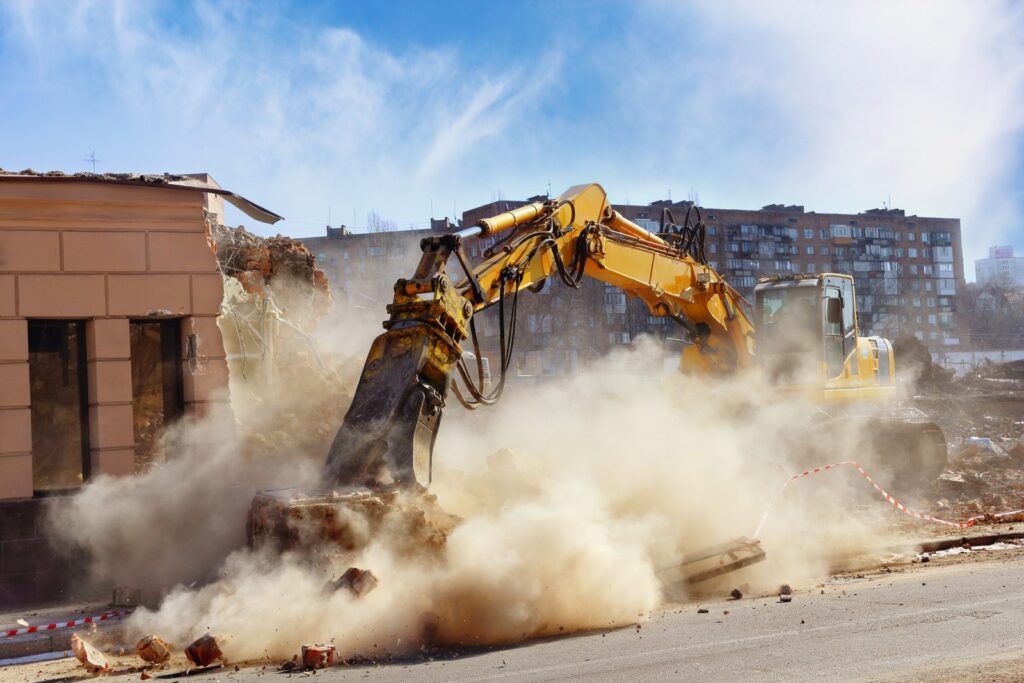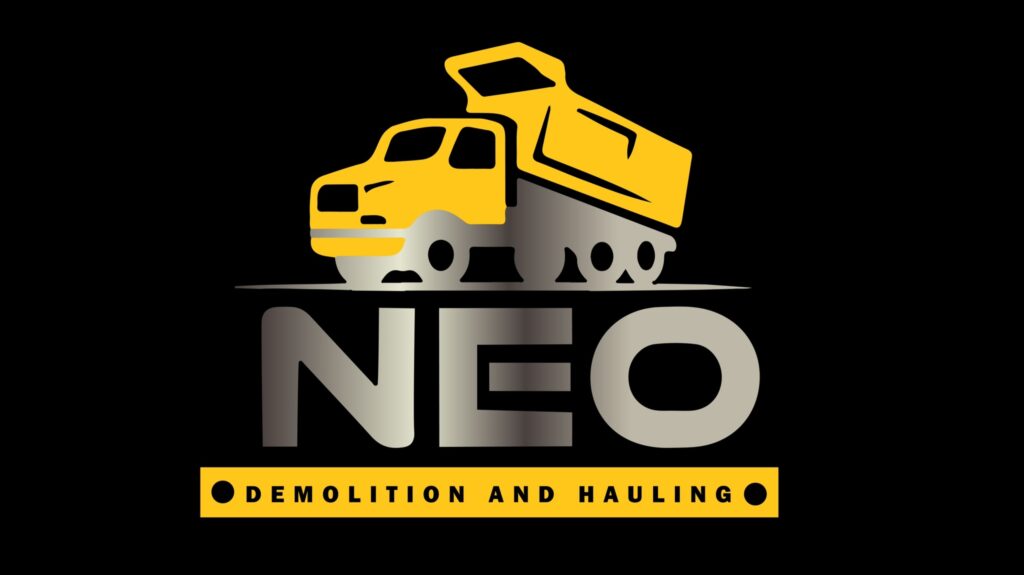In Burbank, the art of building demolition, encompassing both residential and commercial structures, unfolds with unique challenges and distinctive strategies at every step. Let’s delve into this intriguing world, where each project, from a quaint house demolition to a large-scale commercial demolition, is executed with meticulous precision. Understanding these differences is not just a technical necessity; it’s crucial for ensuring that demolition services are conducted safely, efficiently, and in line with local regulations. This is where the services of a local demolition contractor in Burbank is needed.
At first glance, the demolition of a structure might seem straightforward – just knock it down, right? However, there’s much more beneath the surface. Residential demolition contractors in Burbank often deal with smaller-scale projects like house demolition, where personal touches and neighborhood considerations play a big role. On the other hand, commercial demolition contractors tackle larger structures like office buildings or shopping centers. These projects demand heavy-duty equipment, rigorous planning, and a keen understanding of structural complexities. In both scenarios, factors like concrete demolition, interior demolition, and environmental impacts are meticulously considered, showcasing the expertise required in this field.
Safety Protocols and Regulations: Navigating Burbank’s Building Demolition Landscape
When we talk about building demolition in Burbank, whether it’s residential or commercial, safety is the cornerstone. It’s not just about swinging wrecking balls or operating bulldozers; it’s a complex process governed by strict protocols and regulations. Why is this important? Because safety in demolition ensures not just the well-being of the workers but also the protection of the environment and the surrounding community.
In Burbank, demolition contractors, be they residential demolition contractors or commercial, must adhere to a series of rigorous safety standards and local regulations. These standards are designed to mitigate risks associated with building demolition, such as unexpected collapses, flying debris, and exposure to hazardous materials. Let’s break it down – for house demolition, contractors focus on safely disconnecting utilities, ensuring structural stability during the process, and managing waste. Similarly, in commercial demolition, contractors engage in detailed risk assessments to tackle the challenges of large-scale structures, such as office buildings or retail complexes.
Concrete demolition, a common aspect of both residential and commercial demolitions, involves its own set of safety measures. Contractors use specialized equipment and techniques to break down concrete while preventing harm to workers and minimizing dust and noise pollution. This is crucial, especially in urban areas like Burbank, where demolition sites are often close to active businesses and homes.
Interior demolition, another key aspect of the demolition process, requires careful planning and execution. This involves stripping down interiors while preserving the structural integrity of the building. It’s a delicate task that requires precision and a deep understanding of the building’s architecture.
Moreover, Burbank’s regulations mandate that demolition services, whether for a small home or a large commercial building, must consider environmental impacts. This means responsible disposal of demolition waste, recycling materials wherever possible, and minimizing the release of pollutants. It’s not just about tearing things down; it’s about doing it responsibly and sustainably.
Navigating the landscape of building demolition in Burbank demands a thorough understanding of safety protocols and adherence to local regulations. Whether it’s a demolition contractor in Burbank working on a residential project or a team handling a major commercial structure, the focus is always on executing the demolition in a safe, efficient, and environmentally friendly manner. This approach not only ensures compliance with laws but also upholds the standards of safety and responsibility that are the hallmark of professional demolition services.
Cost Considerations in Residential and Commercial Demolition
Discussing the cost aspects of building demolition, particularly in Burbank, is as complex as the demolition process itself. Whether it’s a residential or commercial project, several factors influence the overall expense. Understanding these cost drivers is key for anyone looking to hire a building demolition contractor specifically in Burbank.
Starting with residential demolition contractors, the costs often vary based on the size and complexity of the house demolition. Smaller homes might seem cheaper to demolish, but factors like the presence of hazardous materials (like asbestos), the need for specialized concrete demolition, or intricate interior demolition can add to the cost. It’s not just about knocking down walls; it’s about handling every part of the structure with care and precision, ensuring everything is done safely and in compliance with regulations.
In the realm of commercial demolition contractors, the cost considerations are on a different scale. Demolishing a large building, like an office or a shopping center, involves extensive planning, heavy machinery, and a larger workforce. Commercial demolition also often requires more detailed risk assessments and safety measures, which can add to the cost. These projects might include complex concrete demolition tasks, which demand specialized equipment and expertise.
Another cost factor, common to both residential and commercial demolition, is waste management. After the demolition is complete, there’s a significant amount of debris that needs to be handled. In Burbank, contractors must adhere to strict waste disposal regulations, which can affect the overall cost. Recycling materials like metal, concrete, or wood can reduce waste disposal costs, but this process requires sorting, processing, and transporting the materials, which adds its own expenses.
Let’s not forget the administrative side of things. Securing the necessary permits for building demolition in Burbank is not only essential but can also be a significant part of the cost. Whether it’s for a small house demolition or a large commercial project, understanding and budgeting for these permits is crucial.
The cost of demolition services in Burbank is influenced by a variety of factors, from the scale and complexity of the project to the specifics of waste management and regulatory compliance. Whether you’re looking at residential demolition contractors for a home project or commercial demolition contractors for a larger venture, it’s important to consider all these aspects to get a clear picture of the potential costs involved. This knowledge not only helps in budgeting but also in choosing the right contractor for the job.

Environmental Impact and Debris Management in Burbank Demolitions
When we discuss building demolition in Burbank, be it residential or commercial, the conversation inevitably turns to environmental impact and debris management. This aspect is crucial, as it speaks to our responsibility towards the community and the planet. Whether you’re dealing with a demolition contractor in Burbank or elsewhere, understanding how they handle the environmental aspects is vital.
Firstly, let’s consider the environmental impact of demolition. When a structure comes down, it’s not just about the removal of a building; it’s about what happens to the materials, the dust released into the air, and the potential pollutants. This is where professional demolition services shine. They employ strategies like wetting down materials to control dust, carefully sorting out recyclable materials, and ensuring hazardous substances are treated and disposed of correctly. For instance, in concrete demolition, contractors often recycle the concrete, turning it into aggregate for new construction projects, thereby reducing landfill waste and the environmental footprint.
Debris management is another key element. In Burbank, demolition contractors are required to follow stringent guidelines for debris disposal. This involves sorting debris, recycling as much as possible, and ensuring that waste is disposed of in an environmentally responsible manner. In residential demolition, this might mean dealing with household materials and construction debris, whereas commercial demolition contractors might handle larger volumes of waste, including metals, glass, and concrete.
The process of interior demolition also contributes significantly to debris management. Before the outer structure is dismantled, the interior is stripped. This process allows for the recovery of materials like wood, metal fixtures, and sometimes even architectural elements that can be reused or recycled. By managing these materials responsibly, demolition contractors in Burbank help reduce the environmental impact and contribute to a sustainable demolition practice.
Furthermore, in Burbank, adherence to local regulations regarding environmental protection is non-negotiable. Contractors must follow these rules to the letter, which involves conducting risk assessments, securing the necessary permits, and reporting on their waste management practices. This ensures that every demolition project, whether it’s a house demolition or a large commercial building coming down, is carried out with the least possible harm to the environment.
The environmental impact and debris management in Burbank’s demolition projects are of paramount importance. Both residential and commercial demolition contractors play a crucial role in ensuring these processes are carried out effectively and responsibly. By focusing on minimizing environmental harm and maximizing recycling and proper waste disposal, these professionals demonstrate their commitment to sustainable practices and the well-being of the community.
Conclusion
In wrapping up our exploration of the multifaceted world of building demolition in Burbank, it’s evident that whether it’s a residential or commercial project, each aspect carries its unique set of challenges and considerations. From the meticulous adherence to safety protocols and regulations, understanding the nuances of cost factors, to the commitment to minimizing environmental impact and managing debris, the role of a demolition contractor is both critical and complex. This is where Neo Demolition, a seasoned player in the Burbank demolition scene, excels.
At Neo Demolition, we pride ourselves on our ability to handle every aspect of demolition with expertise, precision, and a deep respect for environmental and community values. Whether you need a residential demolition contractor or a commercial demolition expert, our team at Neo Demolition is equipped to provide top-notch services that meet your needs while ensuring safety, cost-effectiveness, and environmental responsibility. Remember, when it comes to demolition, the right approach and the right team can make all the difference.
Frequently Asked Questions
What is the difference between residential and commercial demolition?
Residential demolition typically involves smaller-scale projects like houses and involves specific considerations like utility disconnections and neighborhood impact. Commercial demolition, on the other hand, deals with larger structures like office buildings, requiring more extensive planning, heavy-duty equipment, and adherence to complex safety regulations.
How is debris managed after a demolition project?
Post-demolition, debris is carefully sorted for recycling and responsible disposal. Recyclable materials like metal, concrete, and wood are processed and repurposed, while non-recyclable debris is disposed of in accordance with local regulations to minimize environmental impact.
What are the key safety protocols in demolition?
Key safety protocols include thorough risk assessments, the use of specialized equipment, strict adherence to structural stability standards, proper handling of hazardous materials, and ensuring the safety of workers and the surrounding community.
How does demolition impact the environment?
Demolition impacts the environment through dust, debris, and potential pollutants. However, responsible demolition practices involve controlling dust, recycling materials, and properly disposing of hazardous substances to minimize environmental harm.

